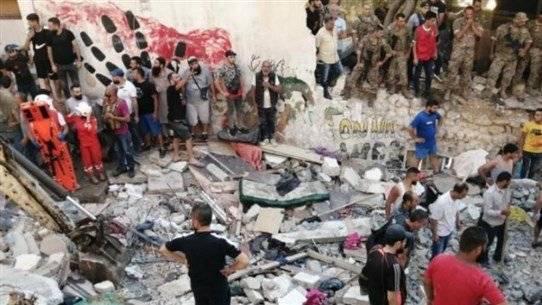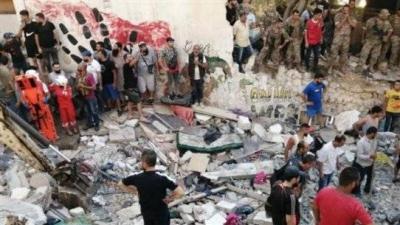The news of the collapse of a building in the neighborhood of Dhahr "Mghara - Al-Qobbeh" in the city of Tripoli has garnered attention and brought to mind a similar incident involving the collapse of a building in the port area at the end of 2019, which resulted in the deaths of the Kakhia brothers. The public sentiment in Tripoli is already fueled by anger towards the state and officials, and the recent collapse has sparked outrage, leading to protests against local officials, the government, and its president, as well as the Tripoli municipality and its mayor. Some roads in the Al-Qobbeh area were blocked as a form of expression of anger and widespread condemnation from the residents.
Five-year-old Jumana Diko lost her life as a result of the collapse of the three-story building, leaving her father, Khaled Diko, surrounded by his pain and despair, trapped under the rubble of the building, with a heart full of grief. The child's funeral became an occasion for residents to express their anger and frustration regarding their conditions due to a corrupt authority that has wronged its citizens. Immediately, local politicians and officials rushed to issue statements of condemnation, solidarity, and condolences, which hold no weight for the families of Dhahr Mghara and the poor areas and neighborhoods.
According to reports, the municipality had previously been informed about this building. When some pointed fingers at the municipality for responsibility, its president, Riyad Yamag, quickly denied accountability in a press conference, stating that "the municipality prepared detailed reports about these buildings and submitted them to the relevant authorities, whether to the General Directorate of Antiquities at the Ministry of Culture or to the Higher Relief Committee and the Ministry of Interior and Municipalities. Additionally, the municipal police issued warnings to residents to evacuate these old or historical buildings at risk of collapse; however, residents refused to evacuate and also declined to renovate their buildings due to their inability to do so."
Former municipal council member lawyer Khaled Subh affirmed that "there are dozens of cracked buildings, especially in the old city, including heritage buildings dating back to the Mamluk and Ottoman periods and the Crusader period in between. Most of these buildings are at risk of collapsing on the heads of their occupants due to the lack of maintenance and restoration work, and the inability of the owners or tenants to undertake such tasks."
He added, "There are complexities surrounding property ownership, numerous heirs, and the legal nature of occupancy. Furthermore, many of these heritage buildings belong to Islamic endowments, and the municipality is unable to carry out reinforcement and maintenance work, especially since these buildings are occupied. Even if the municipality were to undertake such efforts, if the owners refuse and it is recorded as an incurred debt against the property according to current laws, it would pose a dilemma between a house or a landmark... Most of the old area is at risk and is occupied by families who need housing allowances and the municipality lacks the capacity to address an issue of this magnitude."
Subh continued, "According to Minister of Culture Decision No. 1096/2015, municipalities are prohibited from granting any renovation or demolition permits for old buildings before forwarding requests to the Directorate General of Antiquities for review, which hinders renovation work. This issue requires the intervention of the Lebanese government given the complexity of the file and the municipality's inability to manage these works, and a comprehensive government plan must be put in place immediately to address the rehabilitation of these buildings and secure housing for residents."
Regarding the municipality's responsibility, Subh emphasized that "the role of the municipality is to protect public safety by having the engineering department conduct periodic inspections of the buildings and assess their conditions. In the event of danger, notifications should be sent to the building owners to vacate them for demolition or restoration in accordance with the building law and in coordination with the General Directorate of Antiquities. According to Article 74, Paragraph 13, the mayor is responsible for demolishing and repairing dilapidated buildings at the expense of their owners according to building law stipulations. Therefore, if the mayor was aware of this cracked building, and there was a complaint yet did not take necessary action, his responsibility would be negligent."
He also noted that there is an urgent obligation on the part of the government and relevant departments, including the municipality, Interior Ministry, governor, and civil society organizations, to act swiftly to address this issue and the risk of collapses in the old city of Tripoli and the poor areas regarding the cracked buildings.
In addition to the collapsed Dhahr Mghara building, there are dozens of cracked buildings in Dhahr Mghara and other Tripoli areas, all of which are at risk of collapse at any moment. To prevent another catastrophe, the old city of Tripoli needs a rapid and urgent government rescue plan to save innocent lives. The people are crying out and seeking help; will anyone hear and respond?




